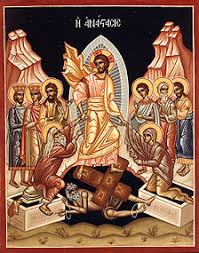Wednesday, October 31, 2012
For Rabbi Lerner on the Cross
Tikkun called for a conversation about the difficulty of the Sacrifice of Abraham. Jews and Moslems find ways of escaping the accusation of child-abuse. What about Christians, who make the cross central? Here is my response, to be published in the Spring issue.
Dear Rabbi Lerner,


Dear Rabbi Lerner,
It seems that what is objectionable is a particular theory of the significance of the Cross: the late Western, Latin and Protestant "satisfaction theory" of St. Anselm of Canterbury (11th C.), and its even later corollary (Calvinist "penal" theory), according to which God required a sacrifice for human sin.. Many contemporary Christian theologians reject this line of thinking, beginning with Gustav Aulen (1930s), who argued that Luther rejected it, too. [See Christus Victor.]
Aulen argued that the classic, ancient Christian view was that, in His Son, God absorbed all the forces of violence into Himself. This notion depends on the Doctrine of the Incarnation, in which Jesus is not only a Prophet or a Sage, but God Himself. The ancients saw this as the "defeat of the devil" by subterfuge - death swallowed up a man, but was poisoned by devouring God. It has nothing to do with sacrifice TO God, but sacrifice - and victory - BY God. Many prefer not even to use the word, atonement (a medieval English coinage), but rather, Redemption. A current variation of this view is found in the "narrative Christus Victor" thinking of Mennonite, Denny Weaver: Non-violent Atonement. (If you google the latter, you will find all kinds of articles about this matter.) Weaver is a fine scholar, who shows that language about "sacrifice for sin" means something different from Anselm's interpretation. [For one thing, the Paschal sacrifice was not a sin offering, but a Covenant meal.]
The notion that God requires innocent suffering is just monstrous. The notion that the Creator willingly becomes the Subject of the consequences of the creative act, sharing - and overcoming - our sufferings, is somewhat more attractive, isn't it?
Another way to look at the Cross is God's ultimate Act of Creation: the tikkun olam par excellence by which the mysterious flaws in Creation are repaired. This cosmic view is found throughout the Orthodox East, as depicted in the ikon of the Resurrection (what the West calls the Harrowing of Hell): the Godman, having broken down the doors of the stronghold of Death, takes Adam and Eve by the hand, to lead them - and all the cosmos - into the Light of the Eighth Day of Creation.
